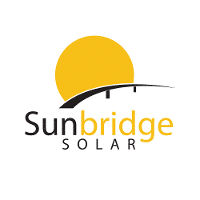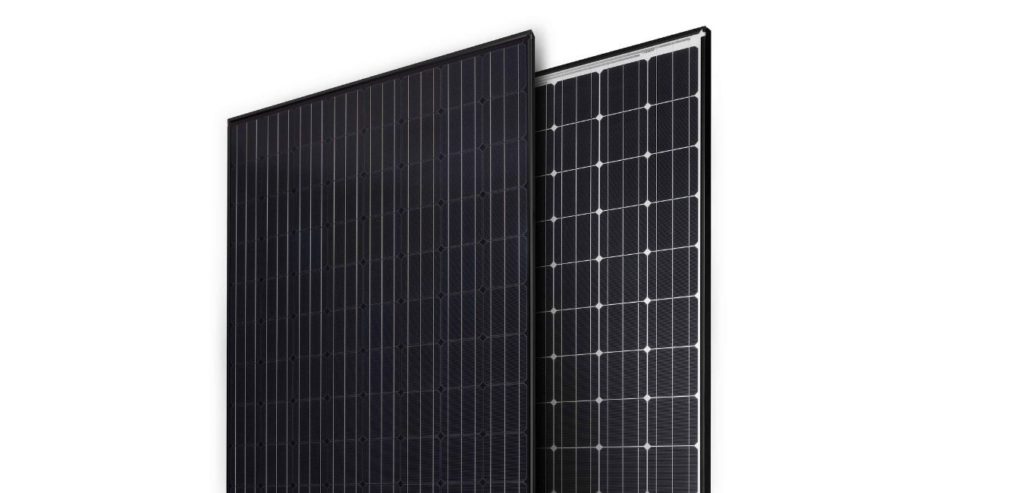A Reputable Global Name
Panasonic is a huge name in consumer electronics, and their HIT solar panels live up to their strong and industry-leading reputation. In this article, we’ll take a look at the specs, price, and warranty of the Panasonic HIT panels and compare them to two other popular residential solar panels; LG & Sunpower
What Makes Panasonic HIT Solar Panels Different?
Panasonic HIT panels are different from other common residential solar panels in several ways.
1) High-Efficiency
First off, they are some of the most efficient panels you can buy right now. The efficiency of a panel refers to its ability to quickly capture the sun’s rays and convert them into usable energy.
For instance, if a high-efficiency panel was tested in the same conditions as a lower-efficiency panel, the high-efficiency panel would produce more electricity in the same time period. So, obviously higher-efficiency panels are more desirable and effective since they can produce more electricity in limited spaces such as on the roof of your home.
Most solar panels available today have an efficiency rating of 14% to 18%, but Panasonic HIT panels will fall between 19.1% and 20.3% efficiency, depending on the exact model. This puts them quite high on the spectrum in terms of efficiency for residential solar panels.
How Efficient Are Panasonic HIT Solar Panels?
They are extremely efficient. Panasonic HIT Solar panels efficiency fall between 19.1% and 20.3%. As we covered in the first section of this article, Panasonic HIT panels beat out much of the competition both in terms of efficiency percentage as well as temperature coefficient.
These durable panels are specifically designed to maximize efficiency and to remain efficient for the entirety of the panels’ lifetime.
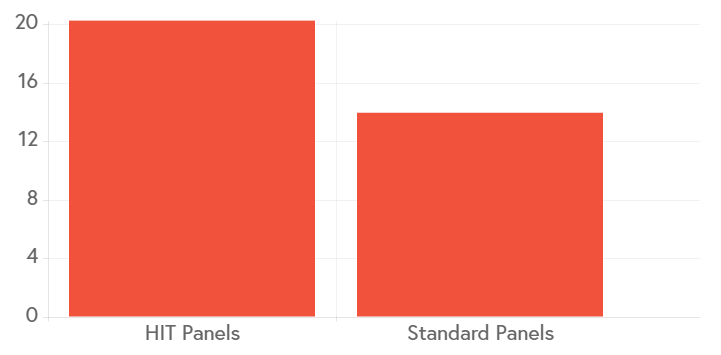
2) Best At Producing Power Under Extreme Temperatures
Solar panel performance also varies based on the temperature like many other electronics, with high temperatures decreasing the efficiency of solar panels significantly. As such, all solar panels are given a temperature coefficient, which refers to the amount of the power output decrease the panel will suffer for each degree C above 25 degrees Celcius. (77 degrees F).
The temperature coefficient is a critical measurement because it can affect the string sizing within your solar energy system, since if it gets too hot, a string of panels may undergo such a decrease of production that the inverter actually turns off. Conversely, if a string is sized for warm weather and then the area experiences a cold snap, the power output can become too much and overwhelm the inverter.
Panasonic’s HIT solar panels have a temperature coefficient of -0.258%/degree C, which is one of the lowest and best coefficients of any solar panels available right now anywhere in the world. This means that for each degree C over 25 degrees C, the solar panels will produce -0.258% less electricity. It is particularly important to select solar panels with a low-temperature coefficient if you live somewhere where the ambient temperature regularly exceeds 77 degrees F.
3) More Advanced Solar Cells
Finally, they are constructed with technology that uses ultra-thin amorphous silicon layers to reduce electron loss. The panels also have a high-strength frame that incorporates a unique water-draining system to help eliminate water stains or pooling on the panel which can attract dirt and dust, greatly reducing the efficiency of the panels.
Are Panasonic HIT Solar Panels Reliable?
The HIT solar panels are very reliable. Panasonic has been performing research and development since 1975 and they debuted the first iteration of their HIT panels in 1997. These panels have a long history of success and have only improved in the years since their introduction.
Additionally, they are built specifically to have a long life. They are constructed with N-type solar cells (96 cells per panel) that result in very low levels of Light-Induced Degradation (LID) and absolutely no Potential Induced Degradation (PID).
The technology in these panels reduces the annual degradation to a minuscule 0.26%, whereas conventionally constructed panels have about 0.70% degradation each year. With these statistics in mind and a confidence in their superior product, Panasonic has guaranteed that after 25 years, their HIT panels will still retain at least 90.76% of their original power output. This is a best-in-industry guarantee.
Black Panasonic Solar Panels
Panasonic HIT panels are indeed available in black. While of course, all modules are primarily black, solar panels generally have white lines running through them. However, the black edition of the HIT panels are super sleek with less noticeable module delineation. These panels look more modern and draw the eye less than standard panels when they are mounted on a dark-colored roof.
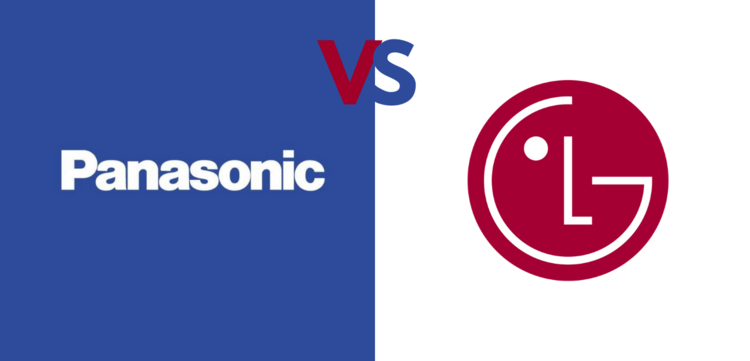
Panasonic vs LG Solar Panels
Next, let’s take a look at some comparison points between Panasonic HIT panels and LG solar panels.
Panasonic Solar Panels
LG has been a leader in the solar energy niche for over 60 years. Their bestselling NeON panels are also highly efficient with a module efficiency that ranges from 20.8% to 21.7% and a 25-year limited warranty. They are also similarly priced to Panasonic panels, although a system with LG panels will on average be slightly more expensive. The temperature coefficient is less desirable, at -0.37%/degree C.
LG Solar Panels
LG Solar has been a leader in the solar energy niche for over 60 years. Their bestselling NeON panels are also highly efficient with a module efficiency that ranges from 20.8% to 21.7% and a 25-year limited warranty. They are also similarly priced to Panasonic panels, although a system with LG panels will on average be slightly more expensive. The temperature coefficient is less desirable, at -0.37%/degree C.
Read More: LG Solar Panels Review
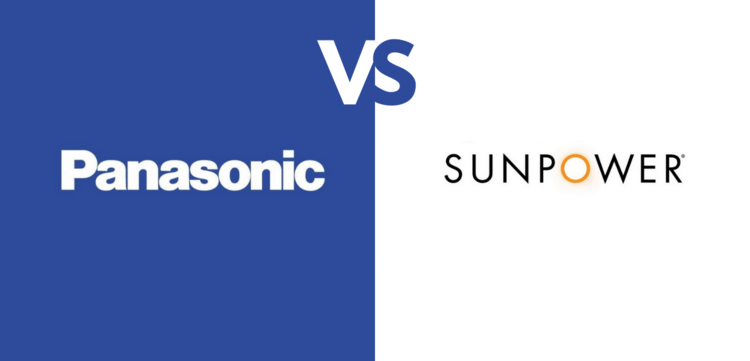
Panasonic vs. Sunpower Solar Panels
Another popular competitor for Panasonic is Sunpower. Let’s see how they stack up.
Panasonic Solar Panels
As we’ve covered, Panasonic HIT panels have an efficiency rating of between 19.1% and 20.3% as well as a 25-year triple protection warranty and a guaranteed power output of over 90% after 25 years.
Sunpower Solar Panels
Sunpower offers panels with up to 22.7% efficiency and they have produced the world’s first 400-watt residential solar panels. Their systems are reasonably priced, even less expensive than Panasonic. However, the temperature coefficient is slightly less optimal than the Panasonic panels at -0.29%/degree C.
With three such amazing options for residential solar panels, it really comes down to the exact specifications you need for your location, whether the cost is an issue and your aesthetic preferences.
Read More: Sunpower Solar Panel Review
Where Are Panasonic Solar Panels Made?
Panasonic HIT solar panels are manufactured at their factories in Malaysia as well as in the United States. They have a factory in Buffalo, New York where they manufacture panels for their own brand as well as their partner, Tesla. However, most of the panels for Panasonic are manufactured abroad.
How Much Do Panasonic HIT Solar Panels Cost?
Price is often one of the most critical factors for homeowners who are considering installing a solar energy system. Obviously, the price of your entire solar energy system will depend on the overall size, which other equipment components (ie inverters, mounting systems, battery storage banks, etc.) you select, the permitting and installation costs, and so forth.
On average, Panasonic panel systems range from about $2.60 to $3.30 per watt, which is solidly in the mid-range as far as per-watt costs. That means that for an average 6 kW solar energy system, you can expect the total cost to be somewhere between $15,600 and $19,800. This is a very competitive rate, especially considering how efficient and durable these panels are.
Fortunately, it is highly unlikely that you will pay anywhere near that amount when it comes time to settle the bill. There are many different federal, state, and local solar incentives available that can help offset the initial investment costs and lower the barrier to entry. These incentives can be in the form of rebates, tax credits, and net metering, which allows you to sell excess energy back to the grid to offset your energy bill in months where your solar energy system produces less electricity.v
Why Is The Cost So Much Less When I Search Online?
When you search for these panels online, you will find the cost per panel, which includes just the panel itself. This cost does not account for the inverter, mounting system, battery backup bank, wiring, permits, installation costs, inspection fees, and so forth. When you install a solar energy system at your home, it is much more involved than simply purchasing a few solar panels.
Panasonic HIT Solar Panel Warranty
Panasonic HIT residential solar panels are backed by a comprehensive Triple Guard warranty. This warranty is good for 25 years and it covers performance, parts, and labor. It guarantees that the panels will still be producing 90.76% or more of their original power output after 25 years.
This is an incredible warranty, and most solar panel manufacturers only offer 10-year warranties. Some of the higher-end panels are covered for 12 or 15 years, but it’s rare to find a 25-year warranty on residential solar panels, which speaks to the durability and quality of the panels as well as for Panasonic’s confidence in their product.
Warranty: HIT Panels Vs Standard Panels
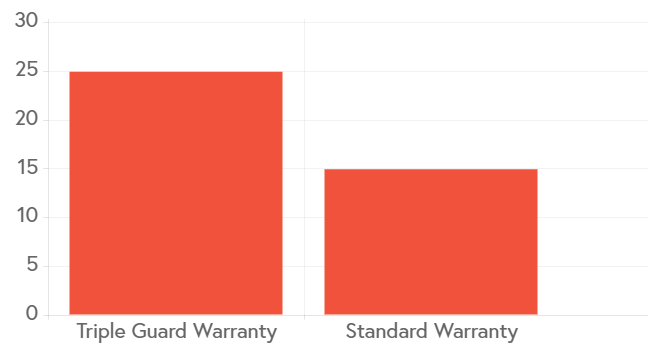
Considering Panasonic HIT Solar Panels?
Are you ready to invest in high-quality, efficient, durable solar panels for your home? Contact our team of experts at Sunbridge Solar today for a quote on an array of Panasonic HIT solar panels! You may also call us at (360) 313-7190.
